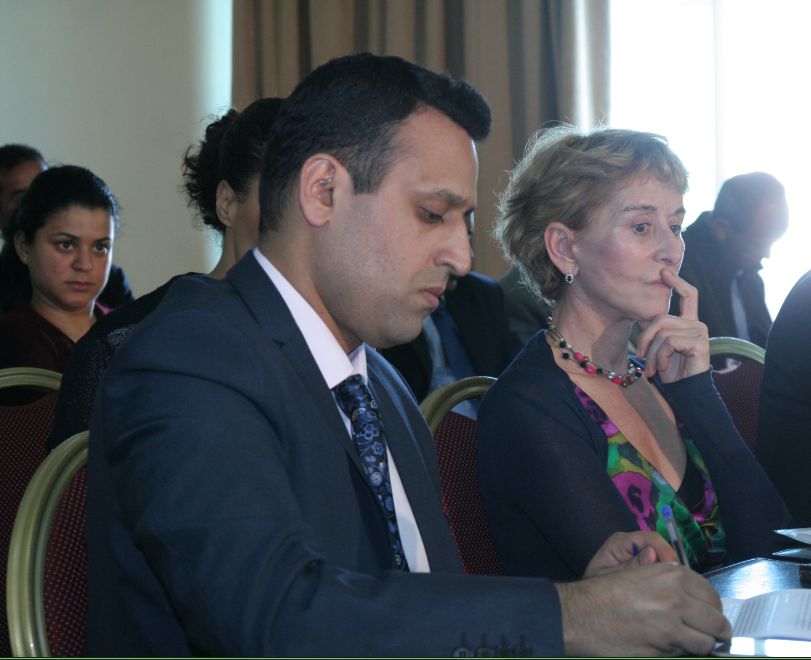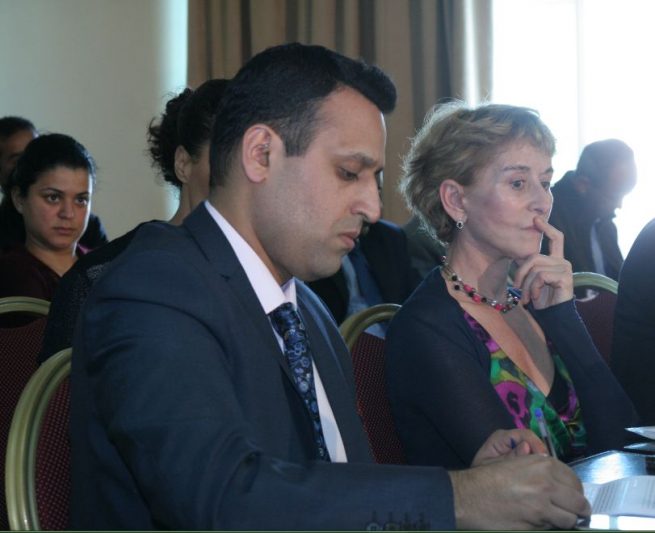 Date: 25 March 2010
Date: 25 March 2010
Country: Morocco
At a roundtable discussion, organized by the Media Diversity Institute (MDI), in Morocco on 25 March 2010, the media, academics & intellectuals debated the subject of ‘Islam and Radicalization’. The event was organised in cooperation with Nawafid Cultural Magazine.
The event was opened by Milica Pesic, MDI executive director, who explained MDI’s objective of encouraging fair, accurate, inclusive and sensitive media coverage in order to promote understanding between different groups and cultures. She also introduced the MDI project in Morocco and explained that organizing events such as this roundtable discussion encouraged open discussion that aimed at creating an atmosphere of communication and understanding.
 The roundtable was moderated by Mr. Mohamed El-Hariti, the managing editor of Nawafid Magazine. The participation of Ghaffar Hussein, from the Quilliam Foundation, attracted great interest from the audience. He explained how his organization is unique because it was founded by former Muslim extremists who renounced extremism, and now fight against it around the world. He also talked about the Islamist groups widely spread across Europe which are more active than the groups in the US and Canada. He tried to explain to the audience the reasons for the strength of these organizations in Europe as compared to the US.
The roundtable was moderated by Mr. Mohamed El-Hariti, the managing editor of Nawafid Magazine. The participation of Ghaffar Hussein, from the Quilliam Foundation, attracted great interest from the audience. He explained how his organization is unique because it was founded by former Muslim extremists who renounced extremism, and now fight against it around the world. He also talked about the Islamist groups widely spread across Europe which are more active than the groups in the US and Canada. He tried to explain to the audience the reasons for the strength of these organizations in Europe as compared to the US.
Following Mr. Ghaffar Hussein’s intervention many participants expressed their opinions on the subject. Mr. Ahmed Khamlishi, the manager of Dar El-Hadith El-Hussania, questioned the reason behind linking radicalization to Islam. He tried to provide answers for this question that he had considered many times himself. He talked about Fatwas as one of the reasons that people who do not know Islam link Islam to radicalization. Mr. Abdul Rahim Maslouhi, a specialist in Political Science, focused on the subject that radicalization is not related to religion and he gave Nazism as an example. He ended his intervention by emphasizing the role of the state in strongly rooting values of modernity, and that respect for diversity in these values is a necessity.
 The roundtable was witness to many different points of views; a situation that reflected the reality in Morocco. Mr. Saad El-Dien Al-Osmani, the ex-President of the Justice and Development Islamic party, said that terrorism has many faces but terrorism practiced by the state is the most severe one. While Mr. Ahmed Asseed, an academic and human rights activist, proposed that secularization of the state is the solution to avoid radicalization and terrorism of all types. Ms. Nabila Mounib, an academic interested in the subject of Islam and woman, focused in her intervention on the importance of developing the education system in Morocco. She considered education as an important tool for rooting out radicalization or avoiding it.
The roundtable was witness to many different points of views; a situation that reflected the reality in Morocco. Mr. Saad El-Dien Al-Osmani, the ex-President of the Justice and Development Islamic party, said that terrorism has many faces but terrorism practiced by the state is the most severe one. While Mr. Ahmed Asseed, an academic and human rights activist, proposed that secularization of the state is the solution to avoid radicalization and terrorism of all types. Ms. Nabila Mounib, an academic interested in the subject of Islam and woman, focused in her intervention on the importance of developing the education system in Morocco. She considered education as an important tool for rooting out radicalization or avoiding it.
The event was covered by several major Moroccan media outlets, including 2M and RTM. The coverage on 2M can be seen here
 The roundtable discussion was organized as part of the Media Diversity Institute’s two year programme, designed to promote diversity and inclusive journalism in Morocco, which is supported by the UK Embassy in Rabat. For more information contact: mona.elhamdani@media-diversity.org
The roundtable discussion was organized as part of the Media Diversity Institute’s two year programme, designed to promote diversity and inclusive journalism in Morocco, which is supported by the UK Embassy in Rabat. For more information contact: mona.elhamdani@media-diversity.org





